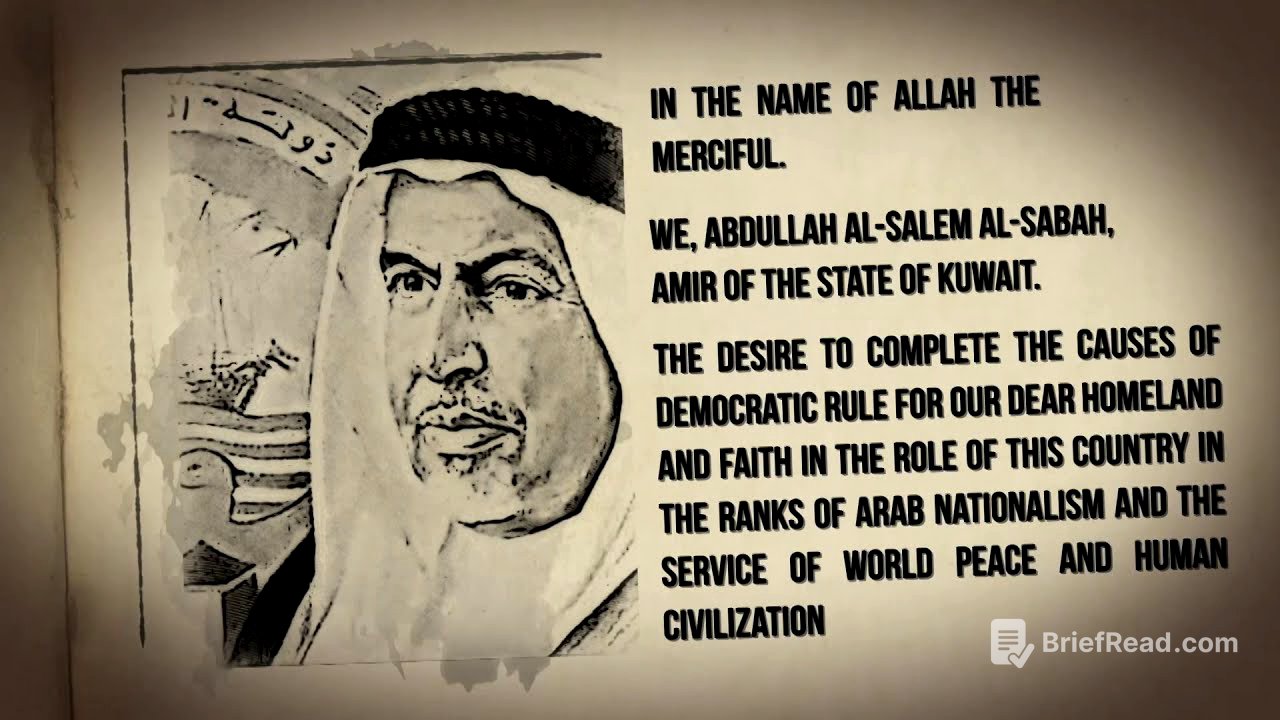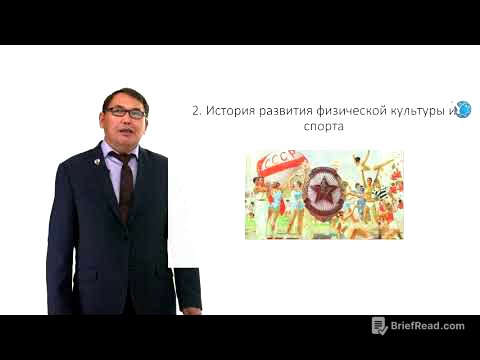TLDR;
This video commemorates the 60th anniversary of Kuwait's independence, highlighting its developmental achievements and vital role in the region and globally. It explores the historical context of Kuwait's independence, its close relationship with the United Kingdom, and its commitment to humanitarian efforts and international cooperation. The video also discusses Kuwait's vision for the future, including economic diversification and its role in promoting peace and stability in the region.
- Kuwait commemorates 60 years of independence, marking significant developmental strides.
- Strong historical ties between Kuwait and the UK are highlighted, emphasizing cooperation across various sectors.
- Kuwait's commitment to humanitarian work, international cooperation, and regional peace is showcased.
- Vision 2035 aims to transform Kuwait into a financial and commercial hub, diversifying its economy.
Introduction: Kuwait's 60th Anniversary of Independence [1:09]
Kuwait is celebrating the 60th anniversary of its independence, a milestone marked by significant developmental progress across various sectors. This anniversary is a pivotal moment to reflect on Kuwait's transformation into a major player with a vital role in the region and a clear impact on the global stage. The British Embassy in Kuwait extends congratulations to the Amir, the Crown Prince, the ruling family, and the Kuwaiti people on this important occasion, which also commemorates the 30th anniversary of liberation from occupation, underscoring the close relationship between Britain and Kuwait.
Historical Context of Kuwait's Independence Day [2:24]
Kuwait gained its independence on June 19, 1961, during the reign of Sheikh Abdullah, with initial celebrations held on June 19, 1962. From 1962 to 1964, Kuwait continued to celebrate Independence Day on June 19th. However, in 1964, an Amiri decree merged Independence Day with the anniversary of the late Emir Abdullah Salem assuming power, corresponding to February 25th, starting in 1965. Since then, Kuwait has celebrated its National Day on February 25th.
Kuwait-United Kingdom Relations [3:13]
The relationship between Kuwait and the United Kingdom is strong, characterized by shared values and cooperation. This relationship, dating back over two centuries, became officially solid in 1899. The royal families have maintained good relations, marked by successful state visits. Cooperation between the two countries is extensive, with many Kuwaitis having graduated from UK universities since the 1950s, further strengthening the bond.
The End of the British Protectorate Treaty [5:34]
On June 19, 1961, the late Emir Sheikh Abdullah Al-Salem Al-Sabah declared the end of the British protectorate treaty by signing the country's independence document with the British High Commissioner in the Arabian Gulf, Sir George Middleton. This day is considered crucial for Kuwait's comprehensive development across various fields.
Defense and Security Cooperation [6:01]
Britain is proud to have participated in the US-led coalition that liberated Kuwait in 1991. The defense cooperation between the two countries is very close and continues to expand into areas like cyber security. Education is also a key area, with more Kuwaitis studying at UK universities than ever before, despite the challenges posed by the COVID-19 pandemic. Scientific cooperation, research, and innovation, particularly in renewable energy and environmental protection, are also important areas of collaboration.
Sheikh Abdullah Salem's Speech and its Impact [8:07]
Sheikh Abdullah Salem's speech after signing the independence document greatly impacted Kuwaitis, inspiring them to build a brighter future. He spoke of moving from one stage of history to another, opening a new chapter with Kuwait's complete independence and full sovereignty. The independence document marked a decisive turning point, canceling the 1899 protection agreement with Britain.
Continued Support and Friendship [9:00]
The United Kingdom has consistently supported Kuwait over many years, marking the 120th anniversary of the 1899 treaty of friendship. Britain has helped Kuwait deter aggression and defend its sovereignty. During the occupation in 1990, the UK played a key role in securing the UN mandate that paved the way for the coalition to liberate Kuwait.
Steps Towards Independence and the Kuwaiti Flag [10:33]
The signing of the independence document was preceded by deliberate steps taken by Sheikh Abdullah since assuming power in 1950, including working to achieve independence and declare the constitution. In the year of independence, an Amiri decree was issued regarding the Kuwaiti flag's shape and colors, marking the first flag raised after independence.
Arab and Diplomatic Reactions to Kuwait's Independence [11:05]
Kuwait's independence resonated greatly, especially at the Arab level, with many statements supporting this event. Arab reactions supported Kuwait's return to its normal position in the Arab ranks as a free, independent, and national sovereign state. The first diplomatic step was establishing the Ministry of Foreign Affairs in August 1961, dedicated to managing the state's foreign affairs.
Establishment of a Democratic System [12:30]
Sheikh Abdullah decided to establish a democratic system with popular participation, aiming for a permanent constitution written by the people. Amiri Decree No. 22 of 1961 was issued to conduct elections for the constituent assembly, fulfilling the desire to establish a government based on clear foundations and democratic principles.
Constituent Assembly Elections and Constitution Drafting [13:05]
Elections were held on December 30, 1961, to select representatives for the constitutional assembly, which was tasked with drafting Kuwait's constitution. Kuwait was divided into 10 electoral districts, each electing two members, totaling 20 seats. Sheikh Abdullah inaugurated the council's first session on January 20, 1962. A constitutional drafting committee was formed, and the constitution, consisting of 183 articles in five chapters, was drafted within nine months.
Presentation and Ratification of the Constitution [14:37]
On November 11, 1962, the draft constitution was presented to the Emir of Kuwait. The late Emir Abdullah Salem delivered a speech emphasizing the establishment of a constitution based on sound democratic foundations. The constitution delineated an integrated organization for a future with more prosperity, international status, political freedom, equality, and social justice. The constitution was ratified three days later and issued on November 11, 1962.
Emir Abdullah Salem's Introduction to the Constitution [15:53]
Emir Abdullah Salem's introduction to the constitution highlighted the desire to complete the causes of democratic rule, faith in the country's role in Arab nationalism, and the pursuit of a better future with more prosperity and international status. It emphasized political freedom, equality, social justice, and the preservation of unity and stability.
Significance and Impact of the Constitution [17:08]
The constitution was a significant step psychologically, marking a real taking over of the reins and showing that Kuwait was taking independence seriously. It was a powerful symbol to unite Kuwaitis, giving them equal rights. The rules were fair, progressive, and written in clear language for all citizens.
First Comprehensive Elections and Constitutional Provisions [18:25]
A few months after the constitution was approved, the first comprehensive elections were held to elect members of the first parliament, signaling the start of political practice under the new constitution. The constitution consolidated the foundations of shura, democracy, and popular participation. The 1962 constitution resulted from historical demands and consultations, embodying the social contract between the ruler and the ruled.
The National Assembly and the Council of Ministers [19:39]
The Kuwaiti constitution stipulates that the number of ministers may not exceed one-third of the members of the National Assembly, meaning no more than 16 ministers. The National Assembly consists of 50 members elected by citizens, and the Council of Ministers can include members of the National Assembly.
Sheikh Abdullah Salem's Legacy and Early Laws [20:24]
Sheikh Abdullah Salem's 15-year rule was one of the most prominent in Kuwait's history, earning him the title of "father of independence" and "father of the constitution." During his rule, Kuwait developed laws and regulations such as the nationality law, currency law, passport law, and the organization of government departments. About 43 civil and criminal laws and legislations were completed, and an Amiri decree was issued to organize the judiciary.
Joining the Arab League and the United Nations [21:30]
Following independence, Kuwait requested membership in the Arab League, which was accepted on July 16, 1961. The UN Security Council then considered Kuwait's application to join the United Nations, granting membership on May 14, 1963. Kuwait proceeded towards the new world order by rejecting aggression, protecting human rights, and believing in the role of the United Nations.
International Conferences and Memberships [22:05]
Kuwait hosted international conferences to support refugees and participated in conferences to support the Palestinian cause. Kuwait was a member of many international institutions, including the Maritime Consultative Organization, the International Union of Wire and Wireless Transportation, the Universal Postal Union, the World Health Organization, the Food and Agriculture Organization, UNESCO, and OPEC.
Domestic Development and Infrastructure [22:52]
Kuwait participated in many Arab social and cultural activities and was equipped with well-organized departments for public works, public health, publications, finance, municipality, post, telegraph, telephone, electricity, water, gas, social affairs, public endowments, radio, and television.
Kuwait's Vision 2035 [23:24]
The years following independence witnessed many achievements, with Kuwait aiming to be the jewel of the Gulf through the New Kuwait 2035 plan. This plan seeks to attract foreign investments and achieve a comprehensive renaissance in all included projects. Cooperation with the United Kingdom is intensifying across various sectors, including media, politics, economics, military, education, and culture.
Accomplishments and Recent Developments [25:36]
Since independence, Kuwait has accomplished much in foreign and domestic policy, realizing its vision for New Kuwait 2035. This vision aims to transform the country into a regional and international financial and commercial center, accelerating the economy and strengthening the role of the private sector. Recent achievements include the opening of the Al-Salam Palace Museum and the Sheikh Jaber Al-Ahmad Al-Sabah Bridge.
Economic Improvements and Diversification [26:48]
Kuwait has taken important steps in economic, social, and human development, focusing on the environment and global partnerships. It entered the list of the 10 most improved countries in the ease of doing business index for 2020. Kuwait is diversifying its economy as part of its 2035 vision, with Boursa Kuwait included in the MSCI Emerging Markets Indices.
Kuwait's Economic Diversification and Market Inclusion [29:33]
Kuwait relies heavily on the oil sector for its revenues and has sought to diversify its economy as part of its 2035 vision. Boursa Kuwait completed the Kuwaiti capital market's inclusion into the MSCI Emerging Markets Indices, bringing in huge inflows to the market. This inclusion represents an important milestone in advancing the Kuwaiti capital market and putting Kuwait on the worldwide investment map.
National and Liberation Day Slogan [31:56]
This year's National and Liberation Day celebration slogan represents Kuwait's effort to achieve and protect peace around the world. The late Emir was known for his endeavors for peace and was called the dean of Arab diplomacy. He convened the first conference of solidarity to raise funds for Syrian refugees and was instrumental in establishing the GCC.
Kuwait's Role in Promoting Peace and Diplomacy [33:20]
Kuwait believes in communication, diplomacy, and democracy, earning it respect in the international arena. The country has hosted negotiations between various parties to broker peace and has a parliament that is one of the oldest and most powerful in the region.
Kuwait as a Humanitarian Center [33:53]
In 2014, the UN recognized Kuwait's generosity and kindness, designating it as a humanitarian hub. Kuwait has shown exemplary leadership in supporting global humanitarian and relief operations, hosting donor conferences for the Syrian people and providing significant contributions.
Contributions to Humanitarian Aid and International Recognition [34:57]
Kuwait's contributions to the UNHCR since 2013 have amounted to approximately $400 million, providing emergency aid to millions affected by conflict. The UN's designation of Kuwait as a humanitarian hub in 2014 was well-deserved due to its initiatives and donations. Kuwait has also co-chaired international donor conferences, raising aid pledges for various causes.
Kuwait's Values and Humanitarian Efforts [35:55]
Kuwait shares values of peace and helping others, with significant contributions to global aid. The country has become a pioneer in international humanitarian philanthropy, hosting many related activities. The UN's honoring of Kuwait has received international praise, recognizing its outstanding efforts in humanitarian action.
COVID-19 Response and International Ties [37:19]
Despite the disruption caused by COVID-19, Kuwait has strengthened international ties by providing financial assistance to regional neighbors and donating to the WHO and UNICEF.
Foreign Policy and Humanitarian Aid [37:58]
Since its independence, Kuwait has pursued a moderate and balanced foreign policy, emphasizing openness and communication. It has been keen to provide humanitarian aid and lift oppression, making humanitarian work an important characteristic of its image.
Kuwait's Role in the UN Security Council [38:17]
Kuwaiti diplomacy spent two years in the UN Security Council, tackling various issues and supporting Arab, Islamic, and humanitarian causes. As the only Arab member, Kuwait represented the voice of the Arabs, addressing issues such as the Syrian crisis, the Palestinian cause, and Yemen.
Achievements in the Security Council [38:53]
During its non-permanent membership in the Security Council, Kuwait enforced its diplomatic mark, presenting solutions to complex issues and coordinating with member countries. Kuwait began its membership on January 1, 2018, and assumed the presidency in February 2018, holding important sessions on Palestine, Iraq, and the UN charter.
Chairing the UN Security Council and Key Resolutions [39:58]
Kuwait chaired the UN Security Council for the month of June 2019, a historical moment for Kuwaiti diplomacy. The council unanimously adopted a Kuwaiti draft resolution on missing persons and armed conflicts, aiming to protect civilians and address the fate of missing persons.
Cooperation with the Arab League and Call for Arab Representation [41:37]
Kuwait released a presidential statement on cooperation between the Security Council and the Arab League, affirming the need for an effective partnership. Kuwait called for permanent Arab representation with full powers in the Security Council in the event of any future expansion, based on objective criteria such as population and the number of Arab countries in the UN.
Kuwait's Commitment to Security Council Reform [42:53]
Kuwait iterated that the Arab group adheres to the realization of real and comprehensive reform of the Security Council, aiming to make it more capable and effective in maintaining international peace and security. Kuwait has called for working towards a solution that achieves the interests of everyone, including the Arab group.
Unique Cooperation and Special Envoy [43:32]
The cooperation between Kuwait and the United Kingdom is unique, with collaboration in every field. The UK appoints a special envoy to the Gulf to help build relations, and Kuwait is proud to play a part in this.
Mediation Efforts and Positive News [44:37]
Kuwait's mediation efforts enabled the signing of the Al-Ula Declaration during the 41st Gulf Summit, a positive start to the year. The UK Foreign Secretary and the EU mentioned the importance of Kuwait's mediation role.
Kuwait's Reputation for Diplomacy and Negotiation [45:18]
Kuwait is proud of its reputation for diplomacy and negotiation and is confident in continuing to foster the belief in working together as a global whole. Current emergencies such as climate change and COVID-19 show the importance of nations coming together to support one another.
The Al-Ula Declaration and Regional Stability [45:50]
The signing of the Al-Ula Declaration signaled the start of a new chapter in pan-Gulf relations and a full restoration of diplomatic ties between Qatar, Saudi Arabia, the UAE, Bahrain, and Egypt. The summit prioritized the interests of the GCC system and Arab national security, delivering a message that the wisdom of GCC leaders can overcome differences.
Renaissance and Future of Kuwait [46:30]
Since independence, Kuwait has accomplished much on the road to a comprehensive renaissance, with the cooperation of its people and wise leadership. The renaissance and advancement of Kuwait are linked to its ability to preserve its identity and rally towards its leadership. Each individual must work to protect the security, pride, sovereignty, and independence of the country.









